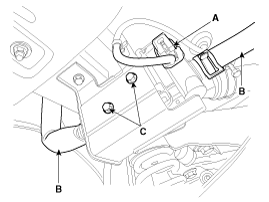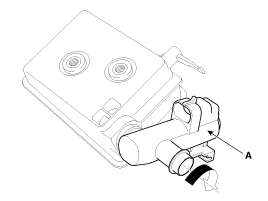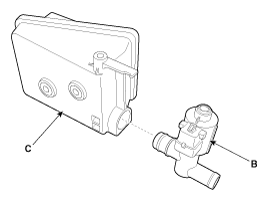Kia Optima Hybrid: Evaporative Emission Control System / Fuel Tank Air Filter Repair procedures
| Removal |
| 1. |
Turn the ignition switch OFF and disconnect the battery negative (-) cable. |
| 2. |
Lift the vehicle. |
| 3. |
Disconnect the canister close valve connector (A). |
| 4. |
Disconnect the ventilation hose (B) from the fuel tank air filter and canister close valve. |
| 5. |
Remove the fuel tank air filter assembly after removing bolts (C).
|
| 6. |
Release the lever (A), and then separate the canister close
valve (B) from the fuel tank air filter (C) after rotating it in the
direction of the arrow in the figure.
|
| Installation |
| • |
Install the component with the specified torques. |
| • |
Note that internal damage may occur when the component is dropped. In this case, use it after inspecting. |
| 1. |
Install in the reverse order of removal. |
 Fuel Filler Cap Description and Operation
Fuel Filler Cap Description and Operation
Description A ratchet tightening device on the threaded fuel filler cap reduces the chances of incorrect installation, which seals the fuel filler. After the gasket on the fuel filler cap and the filler ...
 NVLD(Natural Vacuum Leakage Detection) Description and Operation
NVLD(Natural Vacuum Leakage Detection) Description and Operation
Description NVLD(Natural Vacuum Leakage Detection) is located between the canister and the fuel tank air filter. NVLD is to detect leaks equivalent to a 0.5 mm hole in the fuel tank, canister and hoses. ...
Other information:
Kia Optima Hybrid (TF HEV) 2016-2020 Service Manual: Radiator Components and Components Location
Components 1. Cooling fan assembly2. Radiator assembly3. Mounting insulator4. Radiator mounting bracket5. Radiator upper hose6. Radiator lower hose7. Reservoir tank8. Over flow hose ...
Kia Optima Hybrid (TF HEV) 2016-2020 Service Manual: Components and Components Location
Component Location(1) 1. Head lamp (Low)2. Head lamp (High)3. Turn signal lamp (and Posistion lamp)4. Position lamp (LED) and DRL5. Side marker6. Front fog lamp7. Overhead console lamp8. Room lamp9. Vanity lamp10. Turn signal lamp (O/S mirror) Component Location(2) 1. Tail lamp2. Back up lamp3. Stop/Tail ...



